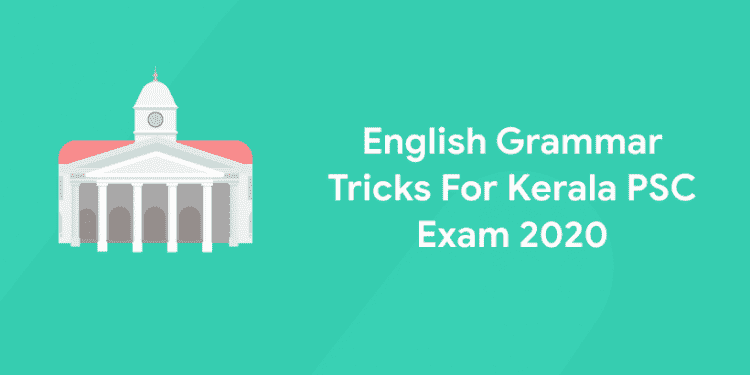English grammar is a very vast and complex subject. It is also an important topic that most of the exams have a part of question paper set aside for this. So is true in the case of Kerala PSC exams. Questions worth 10 marks are asked from this section in almost all the PSC exams. We know every mark is of value in an exam in today’s world of cut-throat competitiveness. So, the question of how to remember every aspects of the vast topic looms at large. The answer could be to memorize the shortcuts and tricks. So, here is an article listing out some of the English grammar tricks for Kerala PSC Exam 2020.
English Grammar Tips for Kerala PSC
Rule 1: I and Me are not interchangeable.
I and me are used in different grammatical constructs. They are not interchangeable. I is used in situations were it serves as the subject of a sentence. Me is a pronoun that acts as the object of a sentence. For example, the sentence ‘Ram and I went for a walk’ is correct. We cannot use me instead of I in this sentence. This is because both Ram and I are the subjects of the sentence. Me is used when someone else is performing the action. For examples, Ram took me for a walk. Here, Ram is the subject and me is the object.
Rule 2: Do not confuse ‘You’re’ and ‘Your’
Although You’re and Your sounds the same, they have two different meaning. Your is a possessive determiner that talks about something owned by you. For example,
Your lunch is getting cold.
Your friends are amazing.
You’re is a contraction of you are. For example,
You’re (You are) going to Chennai.
You’re (You are) known for your writing skills.
Rule 3: Question tags
Question tags are those short questions added to the end of a statements. They are used to turn a statement into a yes or no question. The rule for forming a question tag is a simple one: if the main verb of the sentence is positive, the question tag should take its negative form. If the main verb of the sentence is negative (has “not” in it), then the question tag should take its positive form. A question tag should always conform to the main verb of the sentence. For example,
She forgot her lunch, didn’t she?
She didn’t forget her lunch, did she?
If the main verb of the sentence is “I am,” the question tag that corresponds is “aren’t I.” For example,
I am going to have to change my schedule, aren’t I?
Rule 4: Rules for articles.
No articles should be used in a general way when the names of meals such as Breakfast / Lunch / Dinner / supper are mentioned. After di-transitive verbs like Elect/ Make / Appoint, no articles should be used Except they are used as mono transitive verbs. For example,
I had the breakfast at 9 o’clock in the morning. (wrong)
I had breakfast at 9 o’ clock. (right)
We appointed him a Director (wrong)
We appointed him Director. (right)
Rule 5: Rules for nouns
For the uncountable words, like luggage/ baggage/ furniture/ poetry, articles ‘A/An’ should be not be used before them. The words, such as News / Maths / Ethics / Politics, look like plural nouns but give singular meaning. Some nouns have the same form whether it is singular or plural e.g. Sheep / Deer/Fish / Apparatus. Few nouns are always used in the plural form only e.g. Cattle / People / Police.
Click here for Kerala PSC English grammar questions and answers.
Rule 6: Shortcuts for preposition and conjunction
Use ‘on’ with days of the week, ‘at’ for a particular place or while defining time, ‘in’ for year and month, and more. Prepositions usually go before a noun or a pronoun. A conjunction can never be used before a sentence which is in direct narration and also with an interrogative adverb or interrogative pronoun when the sentence is in indirect narration.
Rule 7: Shortcuts for synonyms and anonyms
Divide the word into suffix and prefix. Identify the meaning of the word and evaluate whether it has a positive or negative meaning. Separate the words from the choices based on their positive or negative meaning. If it is asked to find the meaning of the positive word, it will become much easier to relate the word with the available positive options. On the other hand, the case with antonyms is different. If it is requested or questioned to identify the contrary of a word that has a positive meaning, then its opposite will be one of the terms from the given possibilities, which has a negative meaning.
Rule 8: Shortcuts for adjectives
While comparing the objects, we should see that a noun is compared with another but not with some other word. In comparisons, the monosyllable words like “hot / easy / tall / small” should not be used with more / most. For example,
He is more taller than Raj. (wrong)
He is taller than Raj. (right)
Rule 9: Shortcut for adverbs
Before the word ‘Enough’ an adjective under positive form should be used. When we begin a sentence with ‘seldom / never / hardly / rarely / scarcely / barely / neither / never, the rule of inversion should be applied, an auxiliary verb is used before the subject. For example,
He is brilliant enough to follow you.
Hardly does he go to school.
Conclusion
Grammar is not something that you can master in a day. It is a very vast and complex topic. Spending too much time learning the aspects of grammar in depth for PSC will only lead to loss of time. So prepare smartly and study using shortcuts. Good luck!











